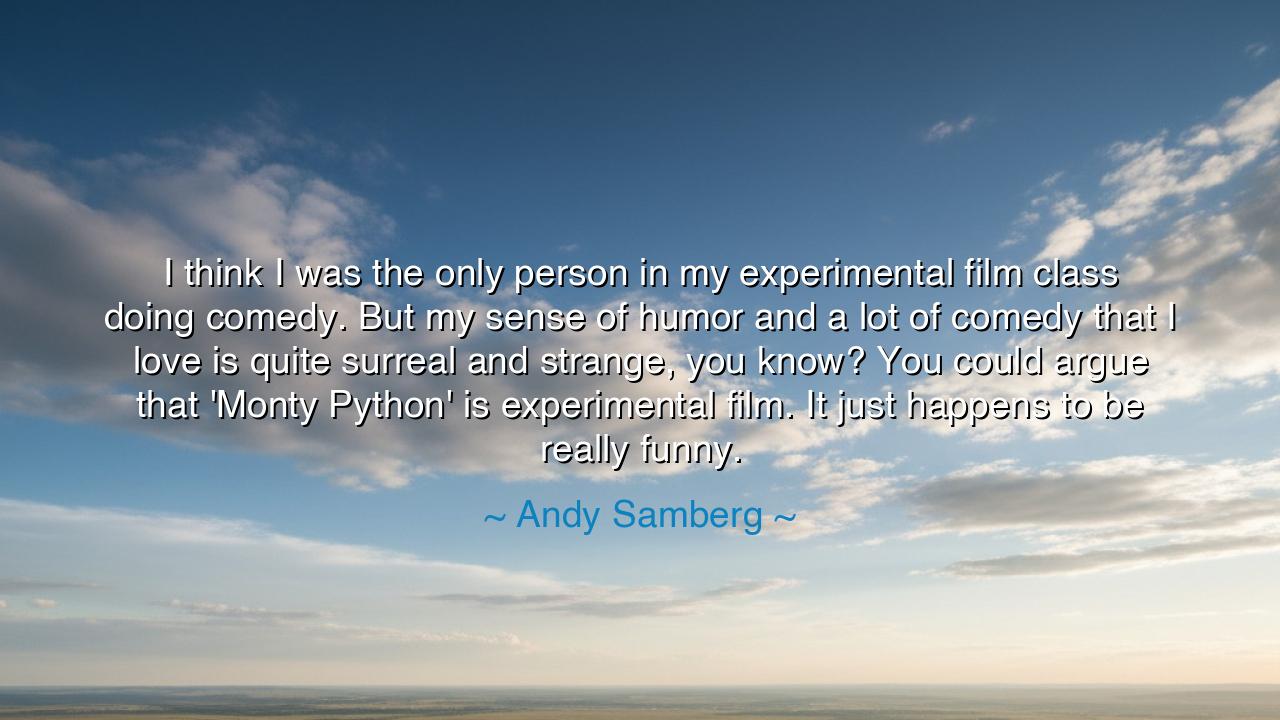
I think I was the only person in my experimental film class doing
I think I was the only person in my experimental film class doing comedy. But my sense of humor and a lot of comedy that I love is quite surreal and strange, you know? You could argue that 'Monty Python' is experimental film. It just happens to be really funny.






Hear now the words of Andy Samberg, the jester-scholar of the modern age, who spoke with humility and insight when he said: “I think I was the only person in my experimental film class doing comedy. But my sense of humor and a lot of comedy that I love is quite surreal and strange, you know? You could argue that ‘Monty Python’ is experimental film. It just happens to be really funny.” In these words lies a revelation about art, courage, and the nature of laughter. For Samberg speaks not merely of humor, but of rebellion—the sacred defiance of expectation that transforms the absurd into the profound.
He stood, a young creator among the avant-garde, in a room where art was expected to be solemn and abstract, where seriousness was often mistaken for depth. And yet, he brought forth laughter. He dared to make people smile where others sought only to bewilder. In this, his confession is not a boast, but a truth for all ages: that comedy is no lesser art, and that the surreal and the comic can dwell together as twin spirits of creation. His words remind us that the boundary between genius and foolishness, between experimental and entertaining, is but a line drawn by those who fear the strange.
Consider the example he gives—the immortal troupe of Monty Python. Their work, born in the shadow of post-war Britain, was not merely humor—it was revolution disguised as absurdity. They shattered the rigid walls of television and film, turning nonsense into meaning and logic into laughter. When they made a sketch about arguing whether an argument was an argument, or knights who demanded shrubbery, they were not merely joking; they were experimenting with the very form of storytelling. As Samberg wisely observes, “you could argue that Monty Python is experimental film—it just happens to be really funny.” The laughter was not a distraction from the art—it was the soul of it.
Throughout history, the fool has often been the greatest philosopher. In the courts of kings, it was the jester who spoke truth, wrapped safely in jest. When others bowed to power, the fool used laughter as a weapon of revelation. So too do comedians like Samberg carry this ancient mantle, hiding wisdom within absurdity. For what is comedy but the art of seeing the world differently? To find humor in the surreal is to reveal that reality itself is absurd—that beneath the surface of order lies the beautiful chaos of existence. Thus, his love of “strange humor” is not eccentricity—it is enlightenment.
There is also courage in what he says. To bring laughter into a room that does not welcome it is an act of quiet heroism. Many artists hide behind solemnity, thinking it grants them gravitas. But Samberg, like the Pythons before him, chose to face the unknown with joy. This is the mark of the true experimentalist: not one who shocks for shock’s sake, but one who dares to play, to explore the boundaries of meaning through mirth. The ancients understood this as the dance of Dionysus—the divine madness that awakens creation. Comedy, in this sense, is divine experiment.
Yet there is humility, too, in his reflection. He does not separate himself from his influences, nor does he seek to stand above them. He recognizes that humor, at its best, is part of a larger tradition—a lineage of artists, fools, philosophers, and dreamers who sought truth not through lectures or tragedy, but through laughter. Surreal comedy, as he describes, is not an escape from reality but a mirror that distorts just enough for us to see ourselves clearly. When we laugh at the absurd, we laugh also at our own pretensions, our fears, and our fragile attempts to make sense of the world.
Therefore, my child of wonder, take this lesson to heart: do not fear to be both strange and sincere. If your work makes others laugh while challenging the mind, you walk the noble path of the wise fool. The world will tell you that comedy is light, that only seriousness can be profound. But remember—light reveals what darkness hides. Humor can carry the weight of truth more gently than any sermon. As Andy Samberg teaches, even the most experimental art may wear a smile.
So go forth and create as he did. Be brave enough to blend the funny with the profound, the surreal with the sincere. Let your laughter be your experiment, your play be your philosophy. For in the realm of true art, the boundary between jest and genius disappears—and those who dare to laugh at the mystery of life are often the ones who understand it best.






AAdministratorAdministrator
Welcome, honored guests. Please leave a comment, we will respond soon